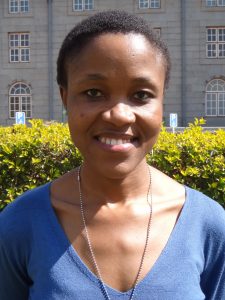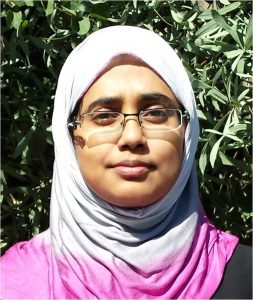Now is the time to act for climate justice
- Published:
By Louisa Feiter
With the COP21 international climate talks coming up in Paris this year – talks that are meant to bring about a universal, legally binding agreement to combat climate change effectively – we talked to two young South African women, both committed environmental activists. They were both featured as part of Mail&Guardian’s 200 Young South Africans last year.
 Lydia Mogano, an Evangelical Christian, has been involved with climate change issues since she joined SAFCEI in 2012. She studied Environmental Psychology and completed a Masters researching bio-cultural diversity and conservation.
Lydia Mogano, an Evangelical Christian, has been involved with climate change issues since she joined SAFCEI in 2012. She studied Environmental Psychology and completed a Masters researching bio-cultural diversity and conservation.
What is your involvement with climate change?
I have been very involved with climate change issues and have attended various climate change events, including two COP international climate talks.
What do you think is important for people to know about climate change?
Climate change is not a separate issue out there that still has to happen. It is happening right now and right here; it is part of our everyday life, even if some of us have not felt it in the raw way other communities have when floods, droughts or cyclones have hit them.
I believe the arguments for climate change do not lie in the scientific data or rest in the hands of the scientists. It is lies with us ordinary people; no one needs to be a technical expert to tell the story of how climate change is affecting us and our world. We need to stop quibbling about the details of climate change – whether it is human caused or natural – people and other forms of life are being negatively impacted and we need to act now. The more we delay in addressing this global problem, the more we risk severe and irreversible impacts. And the worst part of this for me is that the poor, marginalised and vulnerable will be the most hit.
In what ways do we need to act?
I believe one of the ways to do so is by beginning to live consciously and intentionally again. We can no longer live as if the world’s resources are infinite and should consider the material choices we make and what impact these make. Climate change is exacerbating our already existing problems of food security, water scarcity and health issues, we can’t afford to live carelessly any longer.
What do you believe faith has to do with climate change?
Faith, I believe, helps us to respond appropriately: in an ethical and just way. Faith provides us with the moral compass to navigate this time we find ourselves in. I am involved in a multi-faith campaign called We Have Faith – Act Now for Climate Justice which will be mobilising in South Africa from 1 – 6 September through a pan-African cycling caravan that will travel through Southern Africa. Working on this has inspired me; to see people from various faiths come together and work for climate justice, at a time where the world is still experiencing religious conflict, gives me hope that we can all do it. We can all work towards the common goal of addressing climate change and set aside our differences. Campaigns such as these can be vehicles for uniting people nationally and globally.
What final message would you like to impart?
With the COP21 in Paris approaching I would really like to call on all South Africans to make this Climate Conference their own again. We cannot allow ourselves to be soothed by promises made by our governments any longer, we need to move beyond all the other COPs and make sure that legally binding agreements are made. It is us people on the ground that can make meaningful change if we move beyond our individualistic thinking and living and lead by example together. We speak of democracy, we need to start living it. This means changing our priorities from just the self, to include those around us and the generations to come. We need to embrace unity and collaboration and work together as a community.
I appeal to everyone to collectively act, on climate change, on the upcoming COP21, on living ethically and with intentionality. What we do today will matter.
 Fatima Ragie is founder member and project manager of Green Deen, a campaign that aims to highlight environmental issues in the Muslim community. She is a co-opted Board member of SAFCEI and is taking a Master’s degree in Environmental Science at the University of the Witwatersrand.
Fatima Ragie is founder member and project manager of Green Deen, a campaign that aims to highlight environmental issues in the Muslim community. She is a co-opted Board member of SAFCEI and is taking a Master’s degree in Environmental Science at the University of the Witwatersrand.
Climate change is often not taken seriously, what would you say to these people?
In our urban environments, where our lives are so disconnected from nature and from each other, it is often too easy to dismiss climate change. However, we simply need to look at the long term data collected by scientists and read the international headlines about the local impacts of droughts, floods, cyclones and rising sea levels, to begin to understand just how serious climate change is. We cannot ignore what is happening simply because we do not always directly feel the impact of this global crisis.
A lot of people think they can’t do anything about it; that it is something out of their hands
Is global climate change daunting? Yes; as an individual it is so easy to feel overwhelmed and helpless. But we are not just individuals, we are part of communities. Together we define our societies. It is time that we recognise our interdependence with other people and with our environment. We need to turn this interdependence into a strength by working together, and not being blind and ignorant of this environmental catastrophe that is unfolding.
What about the government’s role in mitigating climate change?
We are too often caught up in the mindset that it is only the government’s responsibility to make changes and act upon climate change. This will get us nowhere. We need to be the agents of change in our daily lives. We have to hold the government accountable. We need to demand that our governments listen to us, the people, and not just to big corporations. South Africa in particular is too dependent on fossil fuels. We need to urge the government to change that. We need to make sure change happens by first pressurizing the government to take definitive steps on climate policy, and then by implementing what has been set out.
What do you think about the upcoming COP21 international climate talks in Paris? What role do these play?
Conferences and multi-national agreements are often dismissed as talk-shops. We cite their poor track record as a reason to not engage. However, we often forget the importance of policy-making, and with COP21 approaching, we must not forget that it is these policy decisions that we need if we want to change the structures of industry in a meaningful way. We therefore need to make sure that we hold both our national and international leaders accountable in these processes.
What role do you think civil society can play in these talks?
Campaigns like We Have Faith – Act Now for Climate Justice, which came about during the lead-up to COP17 in Durban, and is once again active now for COP21 in Paris, are good examples of the needed mobilisation on the ground. This campaign brings people of different faiths together with the common goal of working for climate justice. The campaign is launching a cycling caravan that will travel through Southern Africa, raising awareness and collect petitions that demand that our leaders commit to fighting climate change. I urge everyone to participate, whether through this campaign or in any other way, so that we all work together for climate justice.
We are dependent on each other – we breathe the same air, drink the same water, eat the same food – we need to work together as communities to make sure that climate justice happens and is not only paid lip service.
To quote the Noble Quraan: “And it is He (God) who has made you khaleaafa (stewards, successors) upon the earth..." (Ch 6 V165).
You can get involved by supporting the cycling caravan and climate justice events if they are in your area. To stay updated on these, keep checking our Earth Keeper website. Alternatively follow the campaign on We Have Faith’s social media: @ActNowForCJ (#ActNowForCJ #ActOnClimate) and Facebook We Have Faith – Act Now for Climate Justice. And lastly do not forget to sign the petition – we want to hear your voice of faith speaking out against climate change!
Who we are

SAFCEI (Southern African Faith Communities’ Environment Institute) is a multi-faith organisation committed to supporting faith leaders and their communities in Southern Africa to increase awareness, understanding and action on eco-justice, sustainable living and climate change.
Featured Articles
-

South Africa: Who Ends Up Paying If DMRE Cooks the Price of Nuclear Power?
-

South Africa’s nuclear energy expansion plans continue to draw criticism, environmental NGOs chew over legal challenge
-

Earthlife Africa and SAFCEI respond to latest unsettling nuclear news regarding the ministerial determination
-

Open Wing Alliance Africa (Virtual) Summit 2023
-

The Green Connection and SAFCEI respond to energy minister's divisive and deflecting comments
-

Job Vacancy: FLEAT Coordinator







